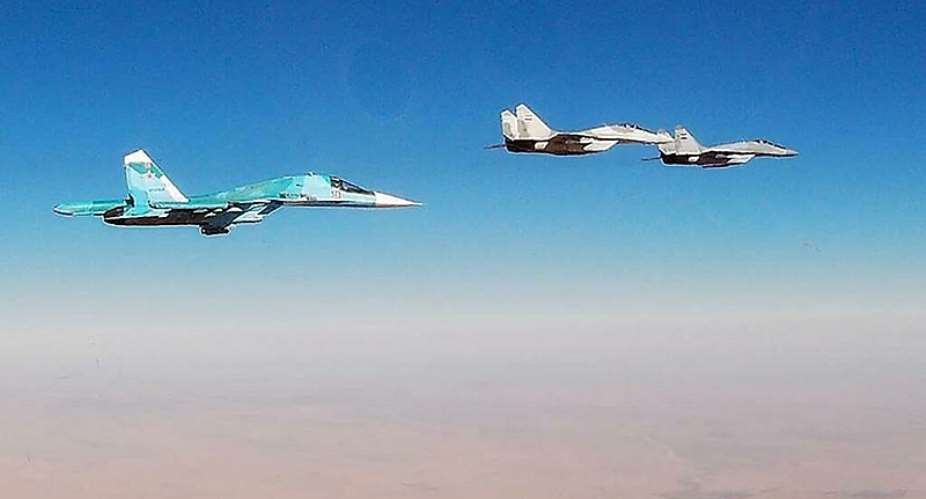Turkey is increasing pressure on Russia's military presence in Syria with the closure of its airspace to Russian planes flying over Syrian airspace and restricting its warships from using Turkish waters.
Turkey's foreign minister Mevlut Cavusoglu has given no reason for closing its airspace to Russian civilian and military planes carrying troops flying to Syria, other than saying the decision will be reviewed in July.
Ankara and Moscow back rival sides in the Syrian civil war but have been cooperating in trying to resolve the conflict.
Some analysts suggest, however, the move should be seen through the prism of Turkey's shared opposition with its Western allies towards Russia's invasion of Ukraine, which has brought it closer to Washington and its NATO partners after years of concern over Turkey's deepening ties with Russia.
"It's an important decision [restricting Russian supply of Syria]. Turkish-American relations have improved dramatically in this respect. Probably the Americans bilaterally and NATO as an institution insisted upon it," said Huseyin Bagci, head of the Turkish Foreign Policy Institute in Ankara, "Trying to close the increasing influence of Russia in Syria and in the Middle East in general. It is, of course, not a decision the Russians would like to see."
Moscow fears supply routes will be compromised
Turkish airspace offers the easiest route for Russian planes supplying its military bases in Syria.
"To maintain the airbase in Syria, of course, they fly over the Turkish airspace and are of importance for Russia," points outs Zaur Gasimov, a Russian expert at Bonn University.
But the closure of Turkish airspace will stoke fears in Moscow that Ankara is cooperating with Washington to cut off Russian supply routes to Syria.
According to Gasimov: "Russia can use the airspace of Iraq and of Iran to reach their military bases in Syria. It's possible that Washington urges pressure on Baghdad to close its airspace."
Russia's supplying of its military forces in Syria is already complicated by Ankara's decision to limit the use of Turkish waters by Russian warships based in the Black Sea under the international Montreux Convention.
- Turkey threatens to dash Swedish, Finnish hopes of quick NATO entry
- Turkey's ambiguous application of United Nations' sanctions on Russia
The convention allows Turkey to impose restrictions if a war occurs among Black Sea countries.
Russian Black Sea ports were, until Ankara imposed the controls, the main supply route supplying Russian forces in Syria.
"Russia was using the Turkish straits to supply its campaign in Syria, and we used to see multiple ships in a week, both Russian Navy - usually landing ships, carrying goods and ships, were transiting Turkish straits to go to Syria," says Yoruk Isik, an Istanbul based geopolitical analyst with the Washington-based Middle East Institute.
"And now all those ships disappear. Only two ships pass in the entire last month. And we are talking about usually four or five ships were passing per week," Isik added.
Moscow's 'balancing act' over Turkey's energy supply
Analysts note that Moscow retains powerful leverage over Ankara, with Turkey heavily dependent on Russian energy.
And any assault by Russian forces on Syrian rebels holed-up on the Turkish border could trigger an exodus of refugees into Turkey.
But the Ukrainian conflict is seen as severely curtailing Russian influence.
"The room for Russian maneouvering vis-a-vis Ankara got very limited," says Gasimov.
"Turkey is one of the countries which still didn't join the anti-Russian sanctions. It's very important for Moscow to maintain the dialogue with those countries and not to augment the ranks and numbers of countries who join the sanctions," he concluded.





 Transport fares hike: GPRTU issue two-day ultimatum
Transport fares hike: GPRTU issue two-day ultimatum
 ARC endorses Alan as presidential candidate – Buaben Asamoa
ARC endorses Alan as presidential candidate – Buaben Asamoa
 Akufo-Addo appoints Kwasi Agyei as new Controller and Accountant-General
Akufo-Addo appoints Kwasi Agyei as new Controller and Accountant-General
 PNC dismiss reports of mass resignations
PNC dismiss reports of mass resignations
 PAC advocates for revenue collectors to be engaged on commission basis, not full...
PAC advocates for revenue collectors to be engaged on commission basis, not full...
 Akufo-Addo commissions Kumasi 1 Thermal Power Plant
Akufo-Addo commissions Kumasi 1 Thermal Power Plant
 Genser Energy commissions 110km of natural gas pipeline at Anwomaso
Genser Energy commissions 110km of natural gas pipeline at Anwomaso
 Naa Torshie calls for tolerance, peace ahead of 2024 election
Naa Torshie calls for tolerance, peace ahead of 2024 election
 Asantehene commends Matthew Opoku Prempeh for conceiving GENSER Kumasi Pipeline ...
Asantehene commends Matthew Opoku Prempeh for conceiving GENSER Kumasi Pipeline ...
 Let’s do away with ‘slash and burn politics’ in Ghana — Dr Adutwum
Let’s do away with ‘slash and burn politics’ in Ghana — Dr Adutwum
